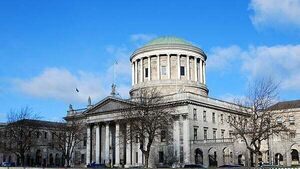GP suspended by High Court to protect the public due to concerns from Medical Council

Seán McCárthaigh
The High Court has approved the suspension of a GP and a prohibition on him practising medicine until the completion of a fitness-to-practice process by the Medical Council in order to protect the public.
High Court president Mr Justice David Barniville granted an application by the Medical Council for the suspension of the GP who has worked as a family doctor for around 35 years.
Lawyers for the Medical Council told the court last week it was necessary to bring the application after being informed by the directors of an out-of-hours GP service in the Leinster area in December 2024 about the doctor’s unusual behaviour and complaints about his clinical practice, as well as concerns for his mental health.
A majority of the complaints related to his poor manner and an approach which “intermittently appears clinically inadequate”, particularly in relation to gynaecological issues.
It was also claimed that there were two very significant “near misses” involving the GP, including where his approach to a patient with acute, severe chest pain was “seriously deficient.”
The court heard allegations that he had failed to act at all on a high blood pressure reading and that the patient, who was subsequently diagnosed the following day with a rib fracture after being referred by his own GP for an X-ray, had found the doctor’s approach to be “seriously dismissive.”
The second case related to his alleged failure to engage adequately with an elderly patient with a chest infection who was subsequently diagnosed as having bilateral pneumonia.
The doctor, who denies having any issues with his mental health, was removed from the roster with the out-of-hours GP service in October 2024.
The court heard that the GP had been assessed by a consultant psychiatrist in April, who concluded that he had a “persistent delusional disorder of persecutory type.”
While the psychiatrist believed the doctor’s medical disability had not, up to the date of the assessment, affected his fitness for work, he suggested that the GP be required to receive appropriate help and support for his health issues as a condition for his ongoing registration.
However, the doctor rejected the psychiatrist’s opinion and recommendation and claimed they were all arranged by a female Garda detective who had been keeping him under surveillance since 2010.
The doctor claimed this female detective had been in the psychiatrist’s office and had met the psychiatrist before his appointment – an allegation denied by the psychiatrist.
He also believed that two more gardaí were working in the service as a receptionist and a driver, as well as that the female detective, together with his former wife and three solicitors, were involved in acts of forgery.
The court heard that the GP told a solicitor from the Medical Council in January that his number was being tapped by the detective.
He told a meeting of the Medical Council on February 12th that he had to close down a practice he was trying to establish due to objections from a management company, which he believed were being done at the instigation of the detective.
At a hearing of the case in June, the GP strenuously opposed the imposition of conditions to his registration, which had been proposed by the Medical Council and also refused to give any undertakings.
He claimed he only wanted to work a few days here and there was a locum.
He also asked the court to order the Medical Council to pay €10,000 towards the cost of his insurance and for €50,000 compensation for loss of income.
In his ruling, Mr Justice Barniville said he was satisfied that the Medical Council had legitimate and reasonable concerns for the protection of the public if the doctor was permitted to continue to practise pending completion of fitness-to-practice procedures.
The judge said his view had been informed by a number of factors, including the nature and content of affidavits sworn by the GP after he had discharged his legal team and his overall presentation in court and his repeated references to a conspiracy against him.
He admitted he was very concerned for the doctor’s mental health “on the basis of what I witnessed.”
However, the judge said he would also give the doctor liberty to apply for the order to be varied or modified to enable him to continue to practise if he was prepared to agree to the conditions proposed by the Medical Council and to give undertakings which were consistent with the recommendations of the psychiatrist.
“Without those conditions or undertakings, I am satisfied that the orders are necessary to protect the public,” said Mr Justice Barniville.



